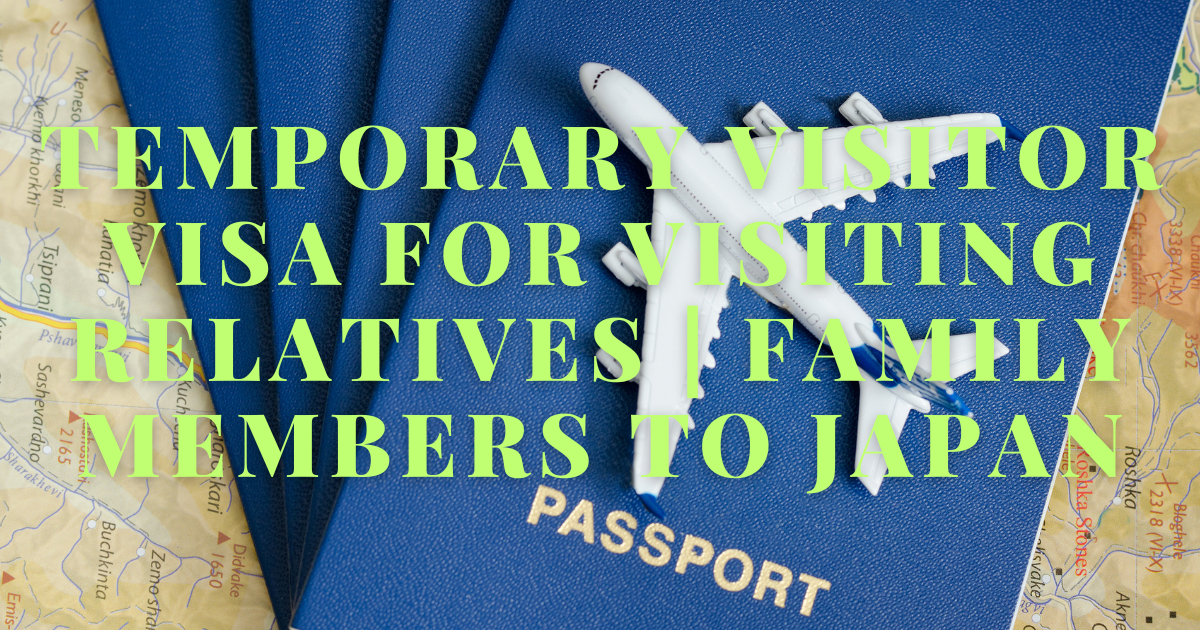Japan, a land of rich cultural heritage and breathtaking landscapes, is a destination that many wish to explore. For those residing in Japan, the desire to share this experience with family members often leads to the need to invite relatives for a visit. This process involves applying for a Temporary Visitor Visa, which allows family members to enjoy a short-term stay in the country. Navigating the visa application process can be complex, but with the right guidance, it becomes manageable.
Countries with Simplified Procedures:
The complexity of obtaining a Japanese short-term visa varies depending on the applicant’s nationality, diplomatic relations between Japan and the applicant’s country, and other factors. Citizens from countries with visa exemption agreements with Japan can enter for short-term stays without a visa, making the process straightforward.
- Asia: Singapore, South Korea, Taiwan, Hong Kong, Macau
- North America: United States, Canada
- Europe: United Kingdom, Germany, France, Italy, Spain, among others
- Oceania: Australia, New Zealand
Countries with More Complex Procedures:
Applicants from countries without visa exemption agreements must apply for a visa, often involving more detailed documentation and stringent screening.
- Asia: China, Philippines, Vietnam, India, Nepal, Bangladesh
- Middle East: Iran, Iraq, Syria
- Africa: Nigeria, Egypt, Ghana
- Others: Russia, Ukraine
Complexity of Japanese Short-Term Visa Application by Country
| Region/Country | Ease of Process | Required Documents/Features | Key Considerations |
|---|---|---|---|
| Asia | |||
| Singapore | Simple | Visa exemption allows entry without a visa | Ensure the passport is valid for the entire stay in Japan |
| South Korea | Simple | Visa exemption allows entry without a visa | Applicable for stays of up to 90 days |
| China | Complex | Invitation letter, schedule of stay, guarantor’s documents required | Additional documents like a guarantor’s certificate of income may be needed if there is an inviter |
| Philippines | Complex | Identification documents, birth certificates, marriage certificates (if applicable) | All documents must be issued by an official authority and within the validity period |
| North America | |||
| United States | Simple | Visa exemption allows entry without a visa | Ensure travel purpose aligns with visa exemption conditions |
| Canada | Simple | Visa exemption allows entry without a visa | Stays must not exceed 90 days |
| Europe | |||
| United Kingdom | Simple | Visa exemption allows entry without a visa | Applicable for tourism, family visits, and business within 90 days |
| Germany | Simple | Visa exemption allows entry without a visa | Ensure all travel documents meet Japan’s entry requirements |
| Russia | Complex | Invitation letter, detailed travel itinerary, proof of relationship required | Additional checks by Japanese consulate may delay processing |
| Oceania | |||
| Australia | Simple | Visa exemption allows entry without a visa | Ensure compliance with visa exemption regulations |
| New Zealand | Simple | Visa exemption allows entry without a visa | Stays must be for tourism, family visits, or business |
| Middle East | |||
| Iran | Complex | Invitation letter, proof of relationship, financial proof required | Additional scrutiny may apply based on diplomatic policies |
| Iraq | Complex | Multiple supporting documents such as guarantor’s proof of relationship and income required | Long processing times expected |
| Africa | |||
| Nigeria | Complex | Birth certificates, detailed explanation of the purpose of visit required | Strict verification of all documents is standard |
| Egypt | Complex | Invitation letter, financial statements, proof of relationship required | Documentation must be translated into Japanese or English if not in these languages |
What are the Necessary Procedures for Inviting Family Members to Japan?
How to Apply for a Temporary Visitor Visa?
The first step in inviting family members to Japan is understanding how to apply for a visa. The Temporary Visitor Visa is specifically designed for tourists, business trips, and visiting relatives. To begin the application process, the inviting party in Japan should prepare to submit a copy of the applicant’s identification alongside a Letter of Invitation and a Schedule of Stay. The application must be submitted to the Japanese embassy or consulate in the applicant’s home country. Ensuring that the application form is filled out correctly and all necessary documents are attached is crucial for a successful application.
What Documents are Required for the Visa Application?
Submitting the right documents is a key aspect of the visa application process. Applicants need to submit a variety of documents, including a valid passport, completed visa application form, and recent photographs. Additionally, proof of the relationship, such as a birth certificate or marriage certificate, must be issued within the specified time frame and submitted. A Certificate of Eligibility, although not always required, can strengthen the application. This certificate is issued by the Ministry of Foreign Affairs of Japan and serves as proof that the applicant meets the necessary conditions for the visa category.
How to Ensure a Smooth Arrival in Japan?
To ensure a smooth arrival in Japan, applicants should carefully follow the requirements set forth by the Japanese embassy. It is important to confirm that all documents are complete and submitted on time. The date of application should be well in advance of the intended travel dates to allow for processing time. Additionally, being aware of the visa exemption policies and ensuring that the application aligns with these policies can prevent delays or issues upon arrival in Japan.
How Does the Visa Application Process Work for Visiting Relatives?
Who is Considered a Relative in Japan for Visa Purposes?
Understanding who qualifies as a relative in Japan is essential when applying for a Temporary Visitor Visa. Generally, immediate family members, such as parents, children, and siblings, are considered relatives. However, extended family members may also be eligible, depending on the circumstances and the purpose of going to Japan. The applicant must clearly state the relationship and provide relevant documentation, such as a birth certificate or marriage certificate, to prove the familial connection.
When Should the Visa Application be Submitted?
The timing of the visa application is critical. It is advisable to submit the visa application well before the planned travel date to accommodate any unforeseen delays. Typically, the Japanese embassy recommends applying at least one month prior to the intended date of travel. This ensures sufficient time for processing and, if necessary, the submission of any additional documents requested by the embassy.
What Happens After the Visa Application is Submitted?
Once the visa application is submitted, the applicant awaits the visa application results. The Japanese embassy will review the application documents and assess the eligibility of the applicant. If approved, the applicant will receive a Temporary Visitor Visa, allowing them to stay in Japan for up to 90 days. In the event of a rejection, the applicant can inquire about the reasons and, if applicable, reapply with the necessary corrections or additional documents.
What Documents are Required for a Temporary Visitor Visa?
Is a Birth Certificate Required for the Visa Application?
A birth certificate is often required when inviting family members to Japan, especially to prove the relationship between the applicant and the inviting party. The birth certificate must be issued by the local civil registrar or an equivalent authority in the applicant’s country. It is vital to submit a copy that is recent and meets the specifications outlined by the Japanese embassy.
Do I Need to Submit a Marriage Certificate?
For applicants who are married, a marriage certificate may be required to support the visa application. This document serves as proof of the marital relationship and must be issued by the appropriate civil authority. If the purpose of the visit involves a spouse residing in Japan, the marriage certificate becomes a critical piece of documentation to include in the application.
How to Obtain a Certificate of Eligibility?
The Certificate of Eligibility is a document that can facilitate the visa application process. Although it is not mandatory for a Temporary Visitor Visa, obtaining one can expedite the application and increase the chances of approval. The applicant or the inviting party in Japan can apply for this certificate through the Immigration Bureau of Japan. The certificate confirms the applicant’s status of residence and eligibility to your family visiting Japan.
Can a Temporary Visitor Visa be Extended in Japan?
What is the Maximum Stay Allowed on a Temporary Visitor Visa?
The Temporary Visitor Visa for visiting relatives typically allows for a maximum stay of 90 days in Japan. This short-term stay is intended for tourism, visiting friends, or family purposes. It is important to adhere to this duration as overstaying a visa can lead to penalties, including fines or restrictions on future visits to Japan.
What Additional Documents are Needed for an Extension?
If an extension of the Temporary Visitor Visa is necessary, the applicant must apply for it before the current visa expires. The application for an extension can be submitted to the local immigration office in Japan. Additional documents, such as a detailed explanation of the reasons for the extension, proof of financial support, and a confirmed itinerary, may be required to justify the need for an extended stay.
Can the Visa be Converted to Another Type While in Japan?
Converting a Temporary Visitor Visa to another type while in Japan is generally not permitted. If the applicant wishes to change their status of residence, such as transitioning to a work or student visa, they must typically leave Japan and apply for the new visa from their home country. However, specific circumstances may allow for an exception, and it is advisable to consult with the Japanese embassy or a legal expert regarding such cases.
What are Common Challenges in the Visa Application Process?
How to Handle a Visa Application Rejection?
Facing a visa application rejection can be disheartening. However, it is important to understand the reasons for the rejection, which may include incomplete documents, discrepancies in the application form, or insufficient proof of relationship. Addressing these issues and reapplying with the correct information can improve the chances of approval. Consulting with an immigration expert or the embassy may provide additional insights into rectifying the application.
What Mistakes Should be Avoided in the Application Form?
Common mistakes in the visa application form include providing incorrect information, omitting necessary documents, and failing to meet the requirements of the Japanese embassy. To avoid these errors, applicants should double-check all entries, ensure that all required documents are included, and verify that they follow the guidelines provided by the embassy. Attention to detail is crucial in submitting a successful application.
How Does the Visa Exemption Affect the Process?
Visa exemption policies can affect the process for certain nationalities. Some countries have agreements with Japan that allow their citizens to enter Japan for short stays without a visa. However, these exemptions are typically for tourism and business purposes, not for visiting relatives. Applicants should verify whether their country is part of the visa exemption list and understand the specific terms and conditions that apply to their situation.


コメント